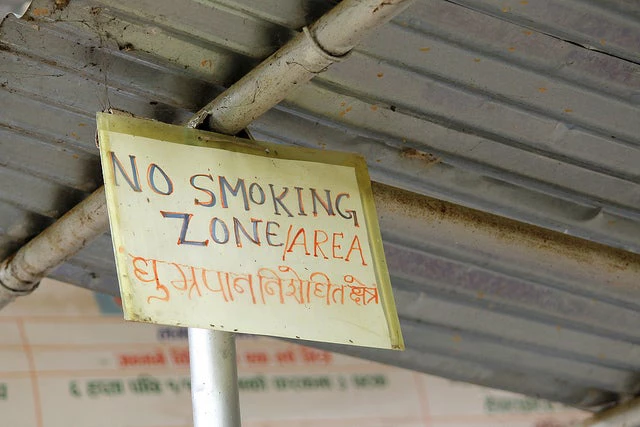
Tobacco use poses an unparalleled health and economic burden worldwide. A new study found that the diseases caused by smoking account for US$ 422 billion in health care expenditures annually, representing almost 6% of global spending on health. Smoking causes close to 6 million deaths per year - more than the deaths from HIV/AIDs, TB and Malaria combined. And the total economic cost of smoking after including productivity losses from death and disability amounts to more than US$ 1.4 trillion per year- equivalent in magnitude to 1.8% of the world’s annual GDP.
Globally, the public health and economic burden of tobacco is increasingly carried by low and middle income countries rather than high income ones. Within low and middle countries, the burden falls hardest onto the poor and vulnerable populations who can least afford the care. While tobacco use has been declining in most high income countries, it has been stable or rising in many low and middle income countries. Currently, over 80% of global deaths from cancer, diabetes, heart and lung disease occur in low and middle income countries, and this disparity is likely to grow based on current tobacco use patterns. Additionally, coping with tobacco related disease takes attention and resources away from other urgent health priorities, limiting capacity to respond to epidemic diseases, build sustainable health systems, and provide people with basic health services. A community that reduces its tobacco use is a healthier and more prosperous one.
These themes are the focus of a new monograph by the National Cancer Institute of the United States Department of Health and Human Services, in collaboration with the World Health Organization: The Economics of Tobacco and Tobacco Control. The monograph finds that tobacco control measures are highly cost-effective and do not harm economies. Though progress is being made in controlling the global tobacco epidemic, existing measures have not yet been used to their full potential. Applying evidence-based interventions, such as significant tobacco tax and price increases, comprehensive smoke-free policies, and bans on all tobacco product advertising, promotion, and sponsorship would reduce the demand for tobacco products and significantly reduce the prevalence of tobacco use and the resulting death, disease, and economic costs.
Frank Chaloupka, Ph.D., Distinguished Professor of Economics at the University of Illinois at Chicago and the lead scientific editor for the monograph concludes, “the evidence is clear - effective tobacco control interventions make sense from an economic as well as a public health standpoint.”
The monograph also highlights the economic opportunities to be found in controlling tobacco. In addition to paying significant dividends for health, tobacco taxes have the potential for domestic resource mobilization. A recent study has shown that if all countries were to raise their cigarette excise taxes by the equivalent of US$ 0.80 per pack, an additional US$ 141 billion in excise revenue from cigarettes would be generated globally. In developing countries, this increase in revenue could help create the fiscal space needed to help achieve their development priorities. Examples from countries such as Egypt, Thailand, the Philippines, and Vietnam demonstrate how these revenues can be channeled into health initiatives, thereby alleviating some of the funding needs for the health sector. The so-called ‘ sin tax’ reforms of the Philippines, for example, provided additional tobacco tax revenues to help finance a significant scale-up of subsidized health insurance for poor families.The Addis Ababa Action Agenda on Financing for Development recognizes that “price and tax measures on tobacco can be an effective and important means to reduce tobacco consumption and healthcare costs, and represent a revenue stream for financing for development in many countries”. The implementation of the WHO Framework Convention on Tobacco Control is one of the targets under Sustainable Development Goal Three: to promote healthy lives and wellbeing for all people at all ages. These processes under the 2030 Agenda, along with the commitments made at the UN High Level Meetings on Noncommunicable Diseases in 2011 and 2014, provide a governance framework for action on tobacco control in relation to development.
In order for the targets of the 2030 Agenda to be met, consideration of tobacco economics needs to be integrated into broader policy, and tackled with a whole of government approach that recognizes the cross-sectoral impact of tobacco. The economics of tobacco control affects our daily lives, our communities and our economies. Tobacco control makes good sense not only from economic and public health viewpoints but from a sustainable development perspective as well.
The Economics of Tobacco and Tobacco Control provides the first comprehensive review of the economics of global tobacco control efforts since the 2003 adoption and 2005 entry into the World Health Organization Framework Convention on Tobacco Control.
Related:
Monograph 21: The Economics of Tobacco and Tobacco Control




Join the Conversation